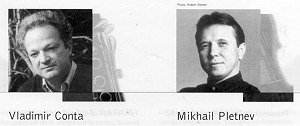I do not often listen to Tchaik No. 1, and cannot be sure whether I have heard it live since an ineradicable morning concert many years ago, when Soviet musicians were first beginning to be allowed to travel. There were other greats assembled, and I think the conductor may have been Norman Del Mar. (Maybe a reader will help?) However, I can still hear in my mind's ear the astonishing weight and authority which Emil Gilels brought to the chords which open the concerto and draw battle lines. The chords always seemed more important than the melody underneath. People have often wondered why this material never comes back again.On May 16 Vladimir Conta and Mikhail Pletnev gave a solution as obvious as it was surprising. The passage, one of the most famous in all concertos, became what it obviously is, just an introduction. The orchestra established its theme as an introduction, Pletnev accompanied them as if preluding, just like a baroque violinist playing himself in before his solo entry by joining in with an orchestral ritornello. It made wonderful sense and made clear also (as had already become apparent before the interval in the eminently forgettable Concert Fantasy) that Pletnev was not into competition by show of strength.
The audience had to listen, and they did. His passage-work was always immaculate, phrasing elegant and expressive, with unexpected turns of phrasing and occasional throwaway moments, this was the same pianist who has captivated me on disc with his marvellous Scarlatti [EMI Virgin Classics VCD5 45123 2 * * * * *] and a new solo Grieg CD [DG 459 671-2 * * * * *]. There was no barnstorming, although near the end his double octaves demonstrated that there is no lack of power at Pletnev's disposal. I was on the non-keyboard side of the mid stalls (pianos usually sound better that side) and I do not think what I heard was merely one of the frequent vagaries of seating position, which can sometime determine the whole of one's reaction. Fascinating, invigorating and another demonstration, if one be needed, that there is really no substitute for live performance.
I do not mind if I never hear the Concert Fantasy Op.56 (1884) again, a two movement work with a quasi rondo followed by Contrasts, a ruminative andante which leads to a molto vivace and reintroduces material from the first movement towards the end. It is the sort of piece that gets included in integrale CD sets and concert series, and worth an airing now and again.
Before retreating behind the piano, Vladimir Conta, who collaborates regularly with Pletnev, showed his own impressive credentials, and the healthy condition of an eager and sympathetic Philharmonia Orchestra, in a superbly integrated account of Romeo & Juliet. From where I sat, to the extreme right, the unusual platform arrangement worked very well, with the violins divided, basses behind the firsts, cellos in the middle in front of wind and timpani, harp between the 2nd violins and brass.
The second concert on May 20 completed Pletnev's review of the Tchaikovsky piano concertos, with performances of Nos. 2 and the unfinished single movement No 3, which preceded it. I had meanwhile bought the scores, and was gratified to verify my hunch about the beginning of No.1. I confirmed that the piano part is marked a single f for those famous chords, against the orchestra ff. The piano only grows to ff after bar 30, at the accelerando towards its cadenza, not reaching fff until a few pages further on at bar 661.
These were played with the same careful integration of piano and orchestra which had been so notable with the 1st concerto. Pletnev's way was particularly appropriate for the slow movement of No 2, in which the piano accompanies solo violinist and cellist from section leaders of the orchestra.
The orchestra had fuller opportunities to shine on its own in this second, lengthier concert. Francesca da Rimini was dramatic but controlled; the repetitive cymbal clashes, which can become wearing, were played with discretion. Capriccio Italien made a complete contrast, with its succession of popular tunes, put together after the model of Glinka's popular Spanish fantasies. Vladimir Conta's conducting gave me pleasure and satisfaction, as it had in the previous concert.
I have had a brief opportunity to sample the CDs of the four works for piano and orchestra, again with Pletnev and the Philharmonia, but conducted by Vladimir Fedoseyev, who appears to have enjoyed an equally close and sympathetic rapport with his soloist as did Conta in the live concerts.[Virgin Classics VBD5 61463 2 7 *****] So far as I can work it out, although all of the concertos (except for the Concert Phantasy, recorded at Walthamstow) were recorded in Abbey Road Studio 1, the set-ups differed slightly between sessions, as do the levels on the CDs. No 3, to which I listened first, surprised me pleasantly by replicating very much a concert perspective, albeit it in a rather reverberant acoustic, but the sort of sound which must have been common in 19th C. concert halls. The balance very similar to that heard at RFH from front Terrace Stalls. For No 1 the level is conspicuously higher, and the microphones seem to have moved in a little closer, but still keeping their distance, so that the piano emerges from within the orchestra in a realistic way which is all too uncommon in studio CDs. It too has a very satisfactory balance, and I have enjoyed these recordings hugely. The standard is maintained in No. 2, and I found myself less hostile towards the Concert Fantasy upon rehearing it. Perhaps another reviewer will evaluate the competition, but this double CD is being sold surprisingly inexpensively, and should be snapped up even if you have other versions.
Reviewer
Peter Grahame Woolf
* * * * *

 Return to:
Return to: